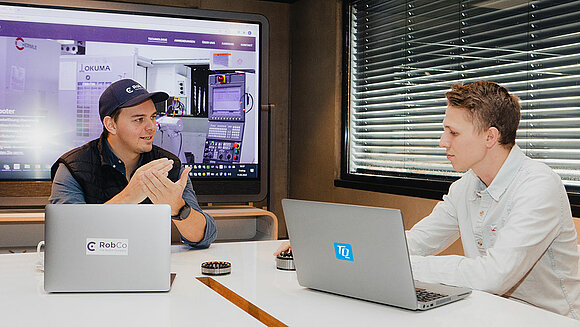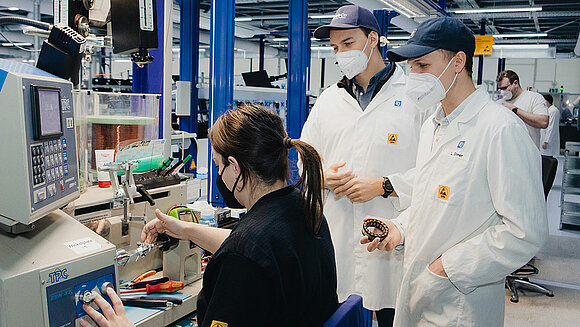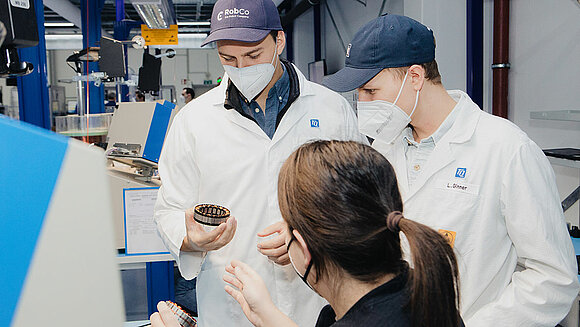TQ explores future markets Interview with start-up RobCo
The start-up RobCo has recognized the potential for automating processes in small and medium-sized companies. The company is addressing this with its modular robot systems. To help you better understand where the current challenges in robotics are, TQ Drives sales representative Lukas Ginner interviewed RobCo's co-founder and CEO Roman Hölzl and asked him about these topics.
Welcome, Roman. I hope you took advantage of the good weather and the fresh snow and went skiing.
[laughs] First of all, thank you for this opportunity. That's right, I was out and about in the mountains over the weekend. We had perfect weather and I was able to recharge my batteries for the coming weeks.
Yes, I can imagine. Switching off in nature helps to take a deep breath, so you can concentrate on work again. Speaking of work, could you briefly introduce RobCo and the roots of your company to us?
Of course. My co-founders Paul, Constantin and I share the same passion: robotics. We met during our research work at the Chair of Robotics and AI at TU Munich - one of the leading robotics institutes in Europe. Our common focus was on modular robotics. At the beginning of 2020, we dared to take the step from researchers to entrepreneurs and founded RobCo GmbH. Now, two years later, we are working intensively on our modular robot kit and platform with more than 25 employees.

You already hinted at something in the preliminary interview - what major challenge have you recently solved at RobCo?
Exactly, we have three major challenges for this phase that we want to overcome. At first our product has to function safely and must be certified in a highly regulated market. We have now completed this important issue. We have certification to ISO10218-1 (industrial robot standard) with all associated sub-standards and relevant standards. This makes us one of the fastest players in Europe with a certified and safe product.
Wow – congratulations again on behalf of TQ. Now let's talk a bit more about entrepreneurship. What was the last year like for you?
Well, in the beginning, of course, it was a question of how to get such a capital-intensive product off the ground. We build hardware, so we have to buy components, and we also have some software. At the end of the day, of course, we also need the smart people who can develop, operate and build it all. At the beginning, we started with a technology transfer program from the EU and the German Ministry of Economics. This enabled us to take the first step from research into practice. Then, in April 2021, we had our first external financing round with Freigeist, the deep tech investment fund of Frank Thelen and his team. In addition, we were able to attract a few more private individuals as investors. This laid an important foundation to be able to achieve our growth targets for this year by further investing in talent, production setup and product development.
Was the German bureaucracy a big challenge for RobCo?
The process of setting up the company was easier than we thought. It is much more difficult to set up the company and, above all, to get the right team on board. At such an early stage, the team is the key to setting the right course for the future. However, at the beginning of the year we were able to convince a few very experienced industry experts to help us reach the next milestones at RobCo together.
TQ and RobCo are both in robotics. Where do you think robotics will go in the future?

In industry and logistics, 9 out of 10 companies are small or medium-sized enterprises - worldwide. Of these, 90% have no automation solution in place. A large part of the work processes are still manual. To name a few examples: It goes from gluing components, to loading or unloading machines, to packing parts, welding or palletizing cartons. With over 10 million small and medium-sized businesses worldwide and such a low level of automation, the potential for our solution is huge.
If the potential is so great, why is the market still so neglected?
We see the reason for this in three challenges in particular: First, the price and thus the time within which the investment pays off must be right. Second, product availability must be given. Some of our major competitors' customers have to wait more than 12 months for their robots. That simply doesn't fit in with the speed and dynamism of medium-sized companies. Here, people tend to look at the clock rather than the calendar [laughs]. The third point is adaptability or flexibility. We observe a greater variety of products and smaller quantities in SMEs*. Local manufacturing, quick adaptability to new orders and short supply chains are important here. That's why we are committed to the following: Availability, Affordability and Adaptability. Our goal is to support German SMEs and to make them internationally competitive and fit for the future.
*small or medium-sized enterprises
The concept of the modular robot is unique on the market. Please explain what makes your company special and how you stand out from the rest.
We approach three topics substantially differently than other players. We offer a standardized, modular construction kit. This makes it very easy to build a number of different robot arm kinematics. Point two is our software. For each robot, we generate a digital twin that takes the kinematic and dynamic data from each module and then builds a digital model. Based on this, we calculate in thousandths of a millisecond which position, which motor current and which torque must be applied to which axis at which time so that the robot moves smoothly in the end. The third point is that customers rarely assemble their robots themselves. Unfortunately, there is currently no way around a general contractor in robotics. RobCo therefore offers a complete package of hardware and software - a "turnkey" robot system, so to speak. But we even want to go one step further. Our vision is that every production manager or plant employee can build a RobCo himself. In the end, this combination of hardware, software and integration services also distinguishes us from our predominantly Asian and American competitors.

You quickly realize how complex robotics actually is and how many different components are needed to be really successful in the end. An important part of robots is, of course, the drive technology. What is important here for you?
Above all, we need a motor with a high torque density and simple integration so that it fits into our module concept. We experimented with a few motors at the beginning, then relatively quickly used the ILM-E motors from your company, he price-performance ratio simply fits. We see ourselves as a German company made by makers for makers. So it's naturally attractive to get in the car 30 minutes from Munich on a Friday morning and visit one of the most important suppliers. In the end, we all benefit from mutual growth and can help companies build innovative technologies in Germany.
That's what I call a nice conclusion, I could not put it in better words. So, thank you for your visit and the exciting insights, Roman.
Thank you for the invitation!